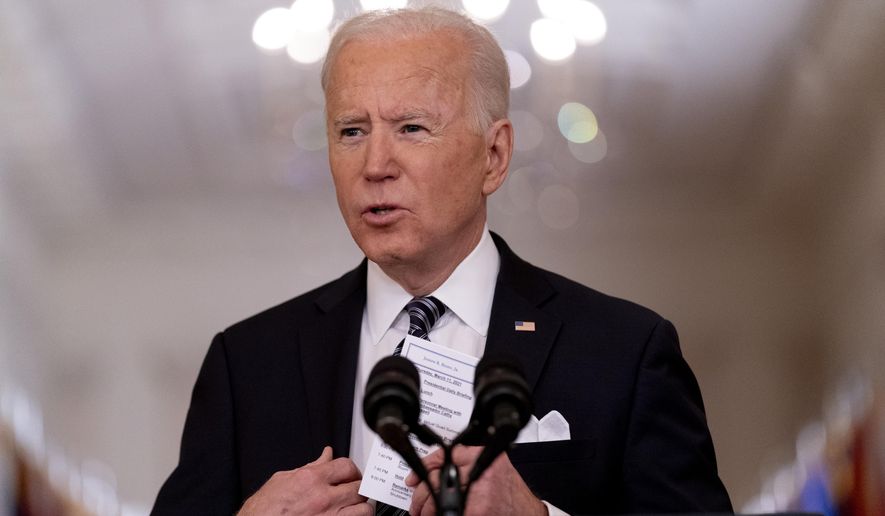President Biden on Monday pledged to share up to 60 million unused doses of the AstraZeneca coronavirus vaccine globally and called Prime Minister Narendra Modi to offer “steadfast support” as India deals with a coronavirus surge that is spiraling into a major public health catastrophe.
Mr. Biden used the Modi call to detail material support the U.S. is sending, including much-needed oxygen supplies, therapeutic drugs and raw materials that will support vaccine production at the Serum Institute of India.
“Prime Minister Modi expressed appreciation for the strong cooperation between both countries,” the White House said in a description of the call.
Senior administration officials characterized the aid package as a way to repay India after it offered assistance during America’s struggles with the virus last year. But it was also in part a bid to head off a growing public relations headache for Mr. Biden over complaints that his administration has been reluctant to spare any COVID-19 vaccines even with ample supplies in the pipeline for every American.
India has a relatively young population and avoided the worst of the COVID-19 crisis earlier in the pandemic. Now, rampant transmission is setting global records for cases — 350,000 per day — and forcing cremation centers to run around the clock. Shortfalls in oxygen supplies and accidental leaks caused some patients to suffocate, adding to families’ desperation.
Experts say the picture on the ground is even worse than what’s been reported.
“Many more cases and deaths aren’t being tracked or reported. The health system has collapsed in many parts of India, without access to oxygen, critical medicines, or hospital beds,” said Krishna Udayakumar, the founding director of the Duke Global Health Innovation Center.
“After the first wave, instead of using time for preparation, there was complacency or a sense of victory, with policy decisions like allowing large events including election rallies that became super-spreader events,” he said. “The central government has failed in its mandate to protect public safety and health. The rise of variants may also be playing a role in the rapid rise of cases, though we don’t know for sure, as well as the potential of waning natural immunity from prior infections.”
The India package amounts to the Biden administration’s biggest foray to date into COVID-19 diplomacy, as health experts and advocates pressure the U.S. to use its relative wealth and influence to lift other nations.
The White House offered 4 million unused doses of the Swedish-British AstraZeneca vaccine — which has yet to be approved for use inside the U.S. — to Canada and Mexico and plans to share up to 60 million more with other countries, as doses become available.
The U.S. enjoys a surfeit of other vaccines compared to other countries, a sore point for some nations who lag far behind on vaccination rates.
“We do not need to use AstraZeneca in our fight against COVID over the next few months,” White House press secretary Jen Psaki said. Senior administration officials estimated that 10 million doses could be available in the coming weeks and 50 million additional doses would come through the pipeline by the end of June.
The drugmaker said it cannot comment on the specifics of the arrangement but noted that “decisions to send U.S. supply to other countries are made by the U.S. government.”
Dr. Udayakumar called the AstraZeneca announcement “a welcome development.”
“The U.S. has been late in its global engagement, and still without a well-articulated comprehensive strategy, but I’m pleased that we are starting to see more action and commitment,” he said.
But some foreign press coverage pointedly accused the Biden administration of being slow on the draw as India’s case loads and death counts soared from COVID-19.
“At the time of writing, Washington was still getting its act together in terms of supplies and logistics,” the Times of India said in a Monday editorial.
The Chinese Communist Party-linked Global Times news website has played up what it called “the U.S.’s indifference and selfishness when asked to help Indian people who are suffering,” noting Washington’s tardy response even as it tries to enlist the Modi government in a “Quad” of Asian allies designed to contain Beijing.
“The U.S. has made little positive contribution to the global fight against the pandemic,” the Global Times said in an editorial Monday. “Lending a helping hand to India can be seen as the first U.S. attempt to play such a role. We hope it will be Washington’s turning point.”
Defense Secretary Lloyd Austin joined the chorus of U.S. officials expressing alarm at the situation in India over the weekend.
“I directed the [Defense Department] to use every resource at our disposal, within our authority, to support U.S. interagency efforts to provide India’s frontline healthcare workers with the materials they need,” he tweeted late Sunday.
The private sector is also offering help. Google CEO Sundar Pichai said he was “devastated to see the worsening COVID crisis in India” in a tweet that pledged $18 million in aid from the company.
• Tom Howell Jr. can be reached at thowell@washingtontimes.com.




Please read our comment policy before commenting.